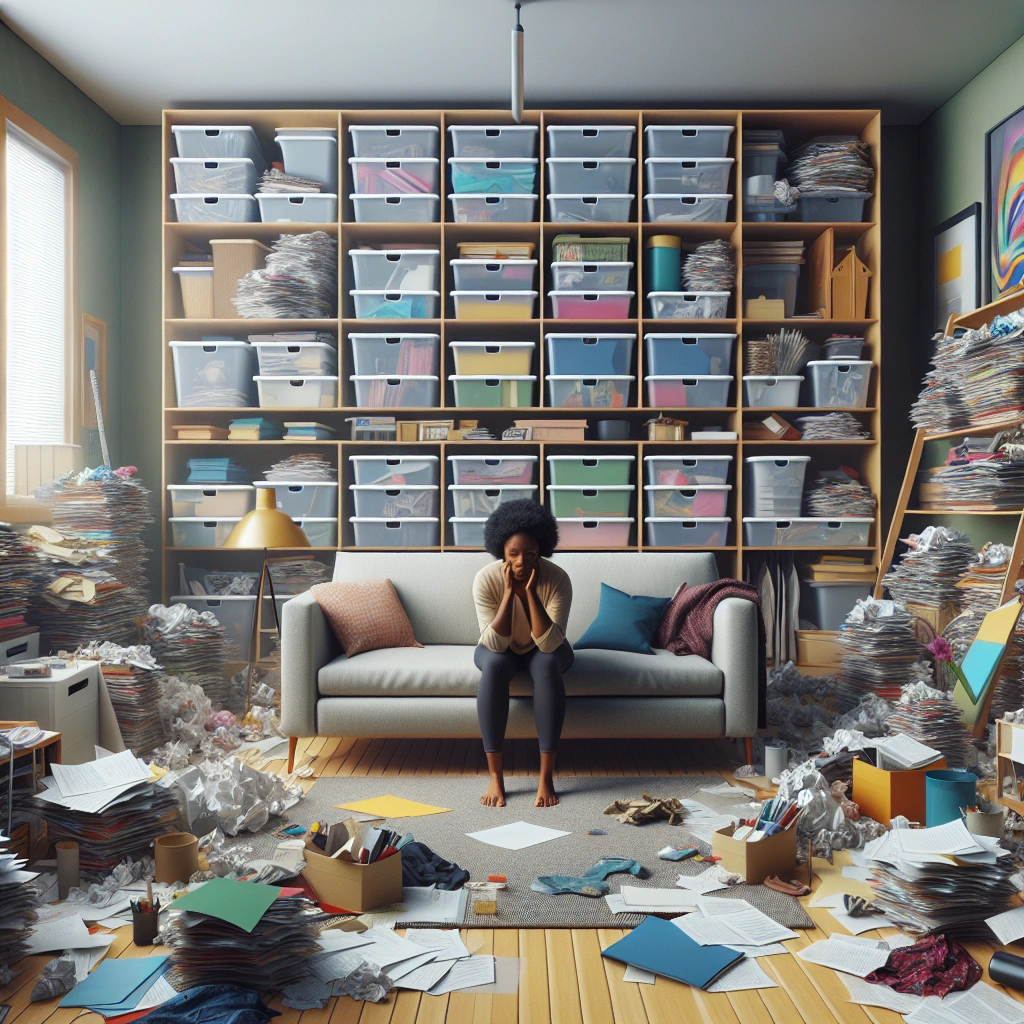

Clutter can have a significant impact on emotions, leading to increased stress, anxiety, and depression. Research has shown that a cluttered environment can result in higher levels of the stress hormone cortisol, contributing to feelings of overwhelm and unease.
The connection between clutter and emotions is clear, as clutter can make it difficult to focus, leading to increased distraction and decreased productivity. Additionally, living in a cluttered space may evoke feelings of shame, inadequacy, and even reluctance to invite others into the home, affecting social relationships and overall well-being.
Check out this Youtube video: “why your messy house causes anxiety, depression, stress & guilt” to learn how clutter affects emotions and impacts mental health.
The Psychological Impact of Clutter on Emotions
Scientific studies and research on clutter and emotions
Clutter has been proven to have a significant impact on emotions. Studies have shown that the presence of clutter in our environments can lead to increased levels of stress, anxiety, and even feelings of overwhelm.
According to research published in the Journal of Environmental Psychology, clutter has a negative impact on overall well-being and leads to decreased productivity. This shows a clear link between our surroundings and our emotional state.
How clutter can lead to stress and anxiety
The presence of clutter can often lead to feelings of stress and anxiety. Our brains naturally favor order, and when we are surrounded by clutter, it sends a signal to our brains that work isn’t yet done.
This can result in increased anxiety as we feel overwhelmed by the tasks needed to put things in order. Clutter can also hinder our ability to think clearly and function effectively in our daily lives, thus contributing to stress and anxiety.
The connection between clutter and feelings of overwhelm
Clutter has a direct connection to feelings of overwhelm due to the impact it has on our perception and brain signaling. When our living or working spaces are cluttered, it can create a sense of unfinished work, leading to a feeling of being inundated with numerous tasks to organize and sort through.
This overwhelming sensation can make it challenging to relax both physically and mentally, affecting our overall well-being.
| Clutter & Emotions | |
|---|---|
| Impact | Clutter has a negative impact on overall well-being, leading to increased stress and decreased productivity. |
| Link to Stress | The presence of clutter can often lead to feelings of stress and anxiety, as our brains prefer order and perceive clutter as unfinished work. |
| Connection to Overwhelm | Clutter creates a feeling of being inundated with tasks, making relaxation challenging and affecting mental well-being. |
The psychological impact of clutter on emotions is clear and significant. The presence of clutter has been linked to increased stress, anxiety, and feelings of overwhelm, highlighting the importance of maintaining an organized and clutter-free environment for optimal emotional well-being.
The Physical Impact of Clutter on Emotions
How clutter affects sleep patterns
Clutter has a direct impact on sleep patterns, leading to sleep disturbances and difficulties falling asleep. Research from Lawrence University has shown that individuals with more clutter report more sleep disturbances, affecting both the duration and quality of sleep.
This is due to the mental tension caused by clutter, disrupting the body’s ability to relax and unwind for sleep. By decluttering, individuals can create a more serene environment conducive to better sleep.
The impact of clutter on overall physical health
Clutter can have adverse effects on overall physical health, increasing the risk of injuries and impacting immune function. Living in a cluttered environment raises the likelihood of tripping and getting injured, posing a danger to physical well-being.
Additionally, clutter can trigger physiological and psychological changes, affecting the body’s ability to fight off illnesses and negatively impacting digestive processes. Hence, decluttering contributes to a safer and healthier living space.
Clutter and its effect on daily productivity and organization
The presence of clutter can significantly diminish daily productivity and organizational capabilities. Studies have revealed that visual clutter reduces focus, hampers concentration, and obstructs workflow as it triggers coping and avoidance strategies.
This, in turn, leads to a decrease in productivity and organization, affecting work satisfaction and increasing emotional exhaustion. Therefore, eliminating clutter is essential for enhancing productivity and promoting efficient organization in daily activities.
How Clutter Affects Mental Well-being
Clutter has a profound impact on mental well-being, with depression being a significant concern. The link between clutter and depression is well-documented, as research has shown higher levels of the stress hormone cortisol in individuals living in cluttered environments.
This link between clutter and depression highlights the negative impact of disorganization on mental health.
Clutter significantly impairs decision-making and cognitive function due to the cognitive overload caused by constant visual reminders of disorganization. Research has demonstrated that the visual distraction of clutter drains cognitive resources, reducing the ability to focus and impacting working memory.
This interference with decision-making and cognitive function further exacerbates the adverse effects of clutter on mental well-being.
The effect of clutter on mood and energy levels is evident, as clutter has been associated with increased stress levels and difficulty in focusing. Additionally, clutter can take a toll on relationships and has been shown to impede efficient visual processing.
This not only alters mood but also escalates stress levels, contributing to a significant impediment to maintaining good mental health.
| Negative Impact | Positive Impact |
| Depression | Increased creativity |
| Cognitive overload | N/A |
| Stress | N/A |
Clutter profoundly affects mental well-being, entwining itself with aspects such as depression, decision-making, and mood. Recognizing the detrimental impact of clutter on mental health can instigate a proactive approach towards maintaining an organized environment for improved well-being.
The Relationship Between Clutter and Relationships
How clutter can affect communication and conflict in relationships
Clutter can significantly impact communication and conflict in relationships. When there is clutter in the environment, it can lead to distractions, making it challenging for individuals to focus on meaningful conversations.
Additionally, clutter can create a sense of chaos and overwhelm, leading to increased irritability and tension during discussions. For example, if a living space is cluttered, it may be difficult to find quiet and peaceful spaces for open communication, leading to misunderstandings and arguments.
The impact of clutter on family dynamics and stress levels
The impact of clutter on family dynamics cannot be understated. A cluttered environment can lead to heightened stress levels for all family members.
For instance, when there is excess clutter in a shared living space, it can lead to feelings of being overwhelmed and perpetuate a sense of disorganization, causing stress and tension within the family. This can also affect the overall harmony and cohesion of the family unit, leading to strained relationships and frequent conflicts.
Clutter and its connection to social anxiety and isolation
Clutter has a direct connection to social anxiety and isolation. A cluttered environment can make individuals hesitant to invite friends or guests over, leading to feelings of social isolation and shame.
Experiencing social isolation due to clutter can significantly impact one’s mental well-being, leading to increased stress, anxiety, and a sense of loneliness. Additionally, clutter can create barriers to social activities, hindering individuals from fully participating in social events and interactions.
| Pros | Cons |
|---|---|
| Improved communication and conflict resolution | Increased stress |
| Enhanced family dynamics and cohesiveness | Social isolation |
| Reduced anxiety and tension levels within the household | Hindered social interactions |
This table highlights the contrasting effects of clutter on relationships, shedding light on both the positive and negative aspects tied to clutter within the home environment.
How to Recognize the Emotional Impact of Clutter
Clutter can cause emotional distress, leading to signs such as increased stress levels, difficulty focusing, procrastination, trouble controlling impulses, and lower quality of relationships. When you find it hard to relax in a messy environment, experience anxiety, and struggle to think clearly amid the mess, these are signs of emotional distress caused by clutter.
Clutter affects emotions by creating a chaotic physical environment, leading to increased stress levels, difficulty focusing, and trouble controlling impulses. Accepting the impact of clutter on mental health requires acknowledging how clutter can affect anxiety levels, sleep, ability to focus, productivity, and overall mental well-being.
Understanding the connection between emotions and the physical environment is crucial. Clutter can evoke feelings of stress and overwhelm if it interferes with everyday functioning.
It is essential to recognize that clutter influences mood and emotions, affecting mental well-being significantly. Accepting the impact of clutter on mental health is the first step toward creating a healthier living environment.
Signs of Emotional Distress Caused by Clutter
| Signs of Emotional Distress |
|---|
| Increased stress levels |
| Difficulty focusing |
| Procrastination |
| Trouble controlling impulses |
| Lower quality of relationships |
Understanding the emotional impact of clutter is essential for creating a nurturing and peaceful environment that supports overall well-being and mental health.
Managing Emotions Through Clutter Control
Strategies for decluttering and organizing spaces
- Start small: Begin by organizing one small area, like a drawer, to avoid feeling overwhelmed.
- Sort items: Categorize belongings into piles for keeping, donating, and discarding.
- Find a home for everything: Assign specific places for items to maintain organization.
The psychological benefits of maintaining a tidy environment
- Stress reduction: A clean space can alleviate “mess-stress” and promote mental well-being.
- Emotional release: Letting go of unnecessary possessions creates room for personal growth and emotional relief.
- Endorphin release: The physical act of cleaning can release endorphins, acting as a pain reliever and boosting mood.
How decluttering can positively impact emotional well-being
- Stress reduction: Removing or controlling clutter can reduce stress, leading to increased happiness and confidence.
- Mental health benefits: Decluttering correlates with reduced depression, anxiety, and feelings of helplessness.
- Emotional well-being: Maintaining a tidy environment can positively impact emotional health, promoting overall wellness.
| Strategy | Key Benefit |
|---|---|
| Start small | Avoid feeling overwhelmed |
| Sort items | Categorize belongings for organization |
| Find a home for everything | Maintain long-term organization and tidiness |
| Stress reduction | Alleviate “mess-stress” and emotional strain |
| Emotional release | Create space for personal growth and emotional relief |
| Endorphin release | Act as a pain reliever and mood booster from the physical act of cleaning |
These strategies, psychological benefits, and their impact on emotional well-being demonstrate the significance of maintaining a clutter-free environment for overall mental wellness.
Overcoming Emotional Attachments to Clutter
Dealing with the emotional connection to personal belongings
Recognize that memories are not tied to physical objects, they’re tied to experiences and feelings associated with them. Take a moment to understand why certain items hold such emotional significance.
Letting go of sentimental items and the impact on emotions
Starting small can build momentum and confidence. Consider thanking the item for its service before parting with it – Marie Kondo’s approach.
Remake or repurpose an item to retain its sentimental value while freeing up physical space.
Coping mechanisms for managing emotions during the decluttering process
When the emotions come up in the decluttering process, stop and examine what you are feeling. Involve friends or family to review and release sentimental items together, and express gratitude to the items being let go.
Embrace and allow yourself to feel the emotions that arise.
Creating a Healthy and Balanced Living Environment
The importance of maintaining a clutter-free space
Maintaining a clutter-free space is crucial for promoting a positive and balanced living environment. Clutter has been shown to contribute to increased stress levels, anxiety, and decreased productivity.
Studies have revealed that individuals with cluttered living spaces experience elevated levels of cortisol, the stress hormone, leading to detrimental effects on mental well-being. Creating an organized and clutter-free environment can support a sense of calmness and peace, enabling individuals to better focus and thrive in their surroundings.
Strategies for preventing clutter from impacting emotions in the future
Implementing regular decluttering sessions and establishing efficient organizational systems are essential strategies for preventing clutter from negatively impacting emotions in the future. Setting aside dedicated time for tidying up, organizing, and decluttering can help individuals maintain a harmonious living space.
Emphasizing the significance of minimalism and consciously evaluating possessions can also aid in preventing the accumulation of unnecessary clutter. Additionally, incorporating daily habits such as putting items back in their designated spaces and avoiding impulsive purchases contributes to sustaining an emotionally positive environment.
Cultivating a positive and nurturing living environment
Cultivating a positive and nurturing living environment involves incorporating elements of aesthetic appeal and personalized touches to elevate the overall ambiance. Introducing elements such as calming color schemes, natural lighting, and meaningful decor pieces can significantly influence emotional well-being.
Furthermore, integrating indoor plants and nature-inspired elements can foster a sense of tranquility and rejuvenation within the living space. Prioritizing comfort, functionality, and personal expression within the environment contributes to creating a nurturing atmosphere that enhances emotional balance and overall well-being.
| Strategies for Preventing Clutter | Benefits |
|---|---|
| Regular decluttering sessions | Promotes a sense of organization and cleanliness |
| Establishing efficient organizational systems | Facilitates easier maintenance of clutter-free spaces |
| Emphasizing the significance of minimalism | Encourages mindful evaluation of possessions and consumption habits |
Seeking Professional Help for Clutter-Related Emotional Distress
Identifying when clutter is negatively impacting mental health
Clutter negatively impacts mental health when it leads to increased stress levels, difficulty focusing, procrastination, trouble with relationships, and a decrease in subjective well-being. Living in disorganization impedes one’s identification with their home, leading to confusion and tension.
Additionally, clutter can result in unhealthier eating habits, poorer mental health, and less efficient visual processing, making it harder to interpret emotional expressions.
The benefits of therapy and counseling for clutter-related emotions
Therapy and counseling provide valuable assistance in addressing clutter-related emotions by teaching healthy coping mechanisms to manage anxiety, stress, and guilt associated with decluttering. These professional interventions empower individuals to navigate the emotional challenges related to letting go of possessions and creating a more organized living environment.
Therapists assist in cultivating a mindset that fosters improved mental well-being and provides support in dealing with the emotional impact of clutter.
Finding support and resources for managing clutter and emotions
Support groups like Clutterers Anonymous and the Clutter Movement Family Support on Facebook offer valuable resources for individuals struggling with clutter-related emotions. These platforms provide a sense of community and understanding, enabling individuals to share experiences and find comfort in knowing they are not alone.
Additionally, hoarding support groups, both in-person and online, assist individuals and families in navigating the complexities of this mental health issue, fostering a supportive network for managing clutter and its emotional impact.
| Type of Support | Description |
|---|---|
| Clutterers Anonymous | Offers a 12-step recovery program, including in-person and online meetings, for individuals dealing with clutter issues. |
| Clutter Movement Family Support | A Facebook support group providing assistance and understanding for families of individuals struggling with hoarding. |
| Hoarding Support Groups | Provides in-person and online support for individuals and families encountering hoarding challenges. |
Let’s make clutter-free living great again!
Recommended Amazon Products for Managing Emotional Distress Caused by Clutter
Here’s a curated list of products that can help you manage emotional distress caused by clutter with ease. These recommendations are based on functionality, price, and reviews.
1. ClosetMaid Pantry Cabinet
The ClosetMaid Pantry Cabinet is a versatile storage solution that can help you declutter your living space and create a more organized environment. With adjustable shelves and a durable design, this pantry cabinet offers ample storage for various items, helping reduce clutter and promote a tidy living space.
Check out ClosetMaid Pantry Cabinet


| Pros | Cons |
|---|---|
| Ample storage space | Assembly required |
| Adjustable shelves | Limited color options |
| Durable construction |
2. SONGMICS Storage Bins
The SONGMICS Storage Bins are a practical solution for organizing cluttered spaces. These foldable fabric storage bins come in a set of 6, offering a convenient way to store and keep various items out of sight. The collapsible design makes them easy to store when not in use, and the neutral color options complement any home decor.
Check out SONGMICS Storage Bins


| Pros | Cons |
|---|---|
| Collapsible design | Fabric may attract dust |
| Set of 6 for versatile use | May not fit larger items |
| Neutral color options |
3. Honey-Can-Do Rolling Storage Cart
The Honey-Can-Do Rolling Storage Cart is a mobile storage solution that helps reduce clutter in various areas of your home. With three spacious tiers and a durable construction, this cart offers a convenient way to store and organize items while easily moving it from one room to another. The cart’s versatility makes it an ideal choice for decluttering and creating a more organized living space.
Check out Honey-Can-Do Rolling Storage Cart


| Pros | Cons |
|---|---|
| Mobile storage solution | Assembly required |
| Spacious tiers | Limited weight capacity |
| Durable construction |
4. iDesign Plastic Refrigerator and Freezer Storage Organizer Bin
The iDesign Plastic Storage Organizer Bin is designed to help you declutter and organize your refrigerator and freezer. With its clear construction and built-in handles, this storage bin provides a convenient way to store food items, reduce clutter, and maximize the available space in your kitchen appliances.
Check out iDesign Storage Organizer Bin


| Pros | Cons |
|---|---|
| Clear design for visibility | Not suitable for all storage purposes |
| Built-in handles for easy access | Size may not fit all refrigerators |
| Versatile storage solution |
5. mDesign Over Door Hanging Storage Organizer Rack
The mDesign Over Door Hanging Storage Organizer Rack is an efficient solution for decluttering and organizing various items in your home. Featuring multiple pockets and a versatile design, this organizer rack can be hung over any standard door, providing extra storage space for a wide range of items while keeping them easily accessible and out of the way.
Check out mDesign Over Door Hanging Storage Organizer Rack


| Pros | Cons |
|---|---|
| Versatile hanging storage | Limited weight capacity |
| Easy installation | May not fit all door sizes |
| Multiple pockets |
Top Recommended Product for Managing Emotional Distress Caused by Clutter
If you’re looking for the best solution for managing emotional distress caused by clutter, we highly recommend the ClosetMaid Pantry Cabinet. With its ample storage space, adjustable shelves, and durable construction, this pantry cabinet offers an effective way to declutter and organize your living space.
Learn more about ClosetMaid Pantry Cabinet


Ready to improve your emotional well-being through decluttering? Check out the ClosetMaid Pantry Cabinet today for the best results!
Conclusion
Clutter can negatively affect emotions by causing feelings of stress, anxiety, and overwhelm. The presence of clutter in a space can lead to a sense of chaos and disorganization, which can in turn contribute to feelings of unease and discomfort.
Furthermore, clutter can also impact emotions by hindering the ability to focus and concentrate. When surrounded by clutter, individuals may feel distracted and find it difficult to relax or feel at ease in their environment.
This can lead to heightened feelings of frustration and irritability.
In addition, clutter can evoke feelings of guilt and shame, as individuals may feel embarrassed by the disarray and messiness of their surroundings. This can lead to a negative impact on self-esteem and overall emotional well-being, further emphasizing the detrimental effects of clutter on emotions.











